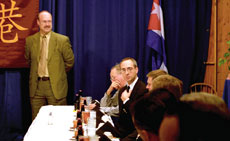Institute announces Cuba Semester

Rod Surber, director of public information, and Dr. David Locher, associate professor of sociology, discuss the Cuban Semester during the media luncheon Jan. 22.
At a media luncheon on Jan. 22, Dr. Chad Stebbins, director of the Institute of International Studies, announced Cuba would be the focus of the fall 2003 semester.
“Cuba is the only communist country in the Western hemisphere,” Stebbins said. “It’s only 90 miles from the coast of Florida, yet it is a mysterious country that we know very little about.”
U.S. policy toward Cuba is softening, and the embargo on U.S. companies trading with Cuba, first imposed in 1962, is weakening.
Sales of food and medicine were allowed in 2000, and the first food shipment included corn from Missouri. After 44 years under communist rule, Cuba is on the brink of change. Fidel Castro, whose forces swept into Havana in January 1959, is 76 years old and in failing health.
“When Castro dies, some eminent changes will take place,” said College President Julio León. “Fidel Castro dominates all aspects of society.
“Cuba is just a few miles from Miami, yet because of the political system and the economic system that they have, they might as well be on the other side of the world. To me it is fascinating.
“Here you have a small island that has become such a center of attention because of what has happened there over the years.”
León said he started focusing on Cuba after a group of students traveled there during spring break 2002, with Dr. Larry Cebula, associate professor of history, and Dr. David Locher, associate professor of sociology.
“I rely on current events and suggestions from faculty members when deciding on a country or region to focus on,” León said.
“I look at a country or region of the world that is relevant and in the news. But at the same time, you want to dedicate a semester to an area that will provide broad academic participation. Some place with an impact, important to all areas of study.”
Theme semesters were implemented to give students a better understanding and awareness of a country or region of the world.
Kasey Hoffman, a student in the class Castro’s Cuba that was team taught by Cebula and Locher, attended the Cuba trip during spring break 2002.
Hoffman said despite reading books and attending lectures prior to her trip, she still didn’t know what to fully expect.
“It is a beautiful country,” she said “The people were amazing.
“I didn’t meet one person who wouldn’t give their left arm to come to America.”
Southern sends approximately 7 percent of students abroad every year, which makes up about 28 percent of a graduating class, Stebbins said. However, there are a substantial number of students who can’t travel abroad because of family or work responsibilities, so the theme semesters are a way of bringing the world to them.
Throughout the spring and summer, Stebbins will be scheduling events and speakers to come to campus. Possible events may include Cuban music and dancing. One event lined up for Sept. 4 and 5 is a lecture by Milton Jamail, author of Full Count: Inside Cuban Baseball.
“We try to achieve a blend between guest speakers and cultural events,” he said. “We want students to experience Cuba as best they can on the Missouri Southern campus.”
Your donation will support the student journalists of Missouri Southern State University. Your contribution will allow us to purchase equipment and cover our annual website hosting costs.



























